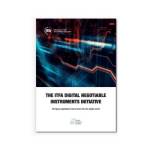Digital Trade Instruments

Access trade, receivables and supply chain finance
We assist companies to access trade and receivables finance through our relationships with 270+ banks, funds and alternative finance houses.
Get StartedContents
Promissory Notes and Bills of Exchange
Before diving into their use cases as digital instruments, one must first understand what exactly promissory notes (PNs) and bills of exchange (B/Es) are.
A B/E is defined as a written order to a person requiring the person to make a specified payment to the signatory or to a named payee. Similarly, a PN is defined as a signed document containing a written promise to pay a stated sum to a specified person or the bearer at a specified date or on-demand.
Both are independent payment undertakings (debt obligations) made from one person to another that are codified in English law under the BoE 1882, which has since been developed and interpreted by courts. The documents typically contain all the terms pertaining to the indebtedness, such as the principal amount, interest rate, maturity date, date and place of issuance, and issuer’s signature.
A B/E differs from a PN in the sense that it is transferable; this means that one party can be obligated to pay another party who was not involved in the creation of the instrument. A B/E is usually issued by one party and endorsed by another. As it has been endorsed or there is an agreement to pay, there is little risk of non-payment.
An important characteristic of B/Es and PNs is that they are totally independent. If they are contingent on other instruments, such as purchase agreements or other underlying transactions, they are generally not accepted. In essence, this makes them irrevocable and unconditional promises to pay, with no defence to non-payment, to a holder who is free to transfer it to another party as they see fit.
Digital trade instruments
The ITFA Digital Negotiable Instrument (DNI) initiative has created a functionally equivalent instrument that operates in the same way as the B/E and PN, delivering the benefits of an eNI under English law. This solution, hereafter referred to as an ePU, is an important step towards achieving full applicability under English Law, specifically the BoE 1882. The ePU delivers a digitally native irrevocable, unconditional, and independent payment undertaking that fulfils all requirements of a traditional NI, albeit subject to contract law rather than common law.

- Digital Negotiable Instruments
- TFG Legal Hub















